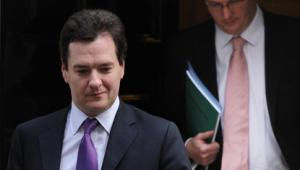By Richard Johnstone | 4 February 2013
Chancellor George Osborne has said UK banks will be broken up if they fail to follow planned rules to protect taxpayers from any future bailouts.
In a speech in Bournemouth on the day that the government introduced the Banking Reform Bill into Parliament, Osborne said there would be ‘no more rewards for failure’ once the reforms were in place.The Bill will implement proposals made by Sir John Vickers’ Independent Commission on Banking to introduce a ‘ring fence’ between banks’ high street operations and investment arms.
Osborne today set out details of how this would ‘insulate retail banking from financial shocks’. High street banks would need to have different bosses from their investment arms, and firms would be barred from using individuals’ savings to fund investments, he said.
If these rules were not ‘respected’, the Treasury and the new Financial Policy Committee at the Bank of England – which will replace the Financial Services Authority from April – could take action to split banks up.
‘My message to the banks is clear,’ Osborne said. ‘If a bank flouts the rules, the regulator and the Treasury will have the power to break it up altogether – full separation, not just a ring fence. We’re not going to repeat the mistakes of the past.’
He added that, when similar rules were implemented in the US, such as the Glass–Steagall Act of 1933, banks had found ways to get around them. ‘Greed overcame good governance,’ Osborne said. ‘We could see that again – so we are going to arm ourselves in advance. In the jargon, we will electrify the ring fence.’
Following the global financial crisis, the UK government became the major shareholder in both Royal Bank of Scotland and Lloyds Banking Group in 2008/09, to save both banks from going bust.
Osborne said his predecessor Alastair Darling ‘felt he had no option’ but to bail out the banks with taxpayer funds. However, these banking reforms would mean ‘the same rules for the banking business as for any other business’.
He added: ‘No more rewards for failure, no more “too big to fail”, no more taxpayers forking out for the mistakes of others.’
Osborne also said the government was continuing to monitor the impact of the Funding for Lending scheme to ensure it had the intended impact.
The scheme was launched last August to give banks access to cheaper loans, with the intention that these savings would be passed on to customers.
Osborne said the programme gives banks an ‘incentive to boost lending to families and businesses’.
He added: ‘We’ve already seen the availability and cost of borrowing coming down, but we are monitoring it closely to ensure that rates and availability continue to improve.’
Responding to the publication of the Bill, Labour said the reforms did not go far enough.
Shadow Treasury minister Chris Leslie said the legislation should include a power to fully separate all banks, rather than Osborne’s proposal that this could be done on case-by-case basis.
‘Unless he legislates for a strong reserve power with the option for full separation of banks across the board, and not just for one or two banks, then this will be of little use,’ he said.
‘The government must implement both the letter and spirit of Vickers recommendations and we must see fundamental cultural change in our banks. If this does not happen, then banks will need to be split up completely.’






















